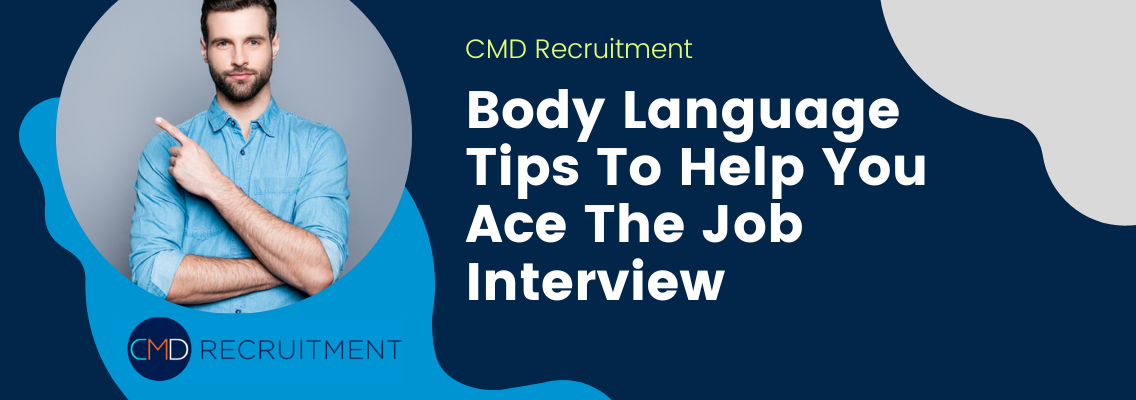Important notice - We are aware of a scam where people are impersonating CMD Recruitment to offer jobs via WhatsApp & Telegram. This is a scam, CMD Recruitment will never contact new candidates via these methods. Any legitmate offer from CMD Recruitment would be made via a telephone call.

August 31, 2022
Your body language during a job interview can be the difference between getting the job and not. In fact, it’s often said that 55% of how we’re perceived by others is determined through our body language, while only 7% of communication is conveyed through words.
You could be saying all of the right things and have a tonne of relevant experience, but if you’re slouched in your chair and appear cocky, there is a good chance the interviewer will decide against hiring you.
So much of our body language is unconscious, so it’s often a case of learning how to present yourself in a particular way in order to appear confident and capable. You can be a naturally shy person and still learn techniques that will make you appear confident. And you might have doubts about your abilities, but your body language doesn’t have to give these away.
The first step in fixing your body language for an interview is understanding the different types of body language and how they are perceived. From there, you can start to learn how to control your body language to make yourself seem like a better hiring prospect.
When it comes to body language, there are two types: nonverbal and verbal. Nonverbal communication includes your posture, facial expressions, eye contact, hand gestures, and touch.
It’s important to be aware of all of these things as they can affect how you’re perceived. For example, if you’re looking down or avoiding eye contact, you may come across as shy or nervous. On the other hand, if you’re making too much eye contact, you might seem aggressive.
Verbal communication is what you say, of course, but it also includes things like the tone of your voice and how fast or slow you’re talking. If you’re speaking quickly, it might indicate that you’re nervous. Or, if you use a lot of filler words (like “um” or “like”), it can make you seem unsure of yourself.
Body language is an important part of how we communicate with others. It can be a deciding factor in whether or not we get a job, make a good impression, or even close a business deal.
So, if you’re heading into an interview, you want to be confident that you’re giving the right impression. Interviewers will often comment on body language after an interview as a way to determine if you seemed enthusiastic about the role and confident in your abilities.
They will also take this as a sign that you are at ease in stressful situations. Even if you are anxious or nervous, being able to take control of your demeanour is a valuable trait for employers.
There are a few common body language mistakes that people make in an interview setting.
There are a few key things you can do to improve your body language and make a better impression in an interview setting. You can’t fix what you can’t see, so try asking friends, family or colleagues for feedback on the things you might be doing that could be holding you back. You could also ask if you can record an interview so you can review your performance afterwards.
If you aren’t sure what you need to improve, here are a few general pointers that you can start to try to improve. Once you become more aware of these traits, it becomes a lot easier to control them. It might take some practice, but it will be worth it in the long term.
First, practice good posture. This means sitting up straight with your shoulders back and avoiding slouching. You should also try to keep your hands relaxed on your lap or on the table.
Second, make eye contact. This shows that you’re engaged in the conversation and interested in what the interviewer has to say. However, you don’t want to overdo it, as too much eye contact can be off-putting.
If you’re in a panel interview, split your time between each person, and make sure you look at the right person when they are speaking. When it’s your turn to talk, switch eye contact between all of the interview panel members.
Third, smile when appropriate. Smiling makes you seem friendly and approachable, which is always a good thing in an interview. Just be careful not to overdo it, as you don’t want to come across as fake or insincere.
Fourth, use hand gestures when you’re talking. This shows that you’re passionate about what you’re saying and helps to emphasize your points. However, you want to make sure your gestures are natural and not too excessive.
Finally, avoid fidgeting. This can be difficult if you tend to fidget when you’re nervous, but it’s important to try to keep your hands still. If you need somewhere to put them, try resting them lightly on the table or on your lap.
By following these tips, you can improve your body language and make a great impression in an interview setting. Just remember that body language is just as important as what you have to say, so don’t let your posture or hand movements let you down.
Back to Blog